Choosing the Right Diesel Fuel Hose for Your Vehicle Needs
Dec . 10, 2024 02:01 Back to list
Choosing the Right Diesel Fuel Hose for Your Vehicle Needs
The Importance of Diesel Fuel Hoses in Automotive and Industrial Applications
In the world of diesel engines, efficiency and reliability are paramount. One of the unsung heroes in ensuring these qualities is the diesel fuel hose. Often overlooked, these hoses are critical components in both automotive and industrial systems. This article will explore the purpose, construction, types, maintenance, and safety considerations of diesel fuel hoses.
Understanding Diesel Fuel Hoses
Diesel fuel hoses are specifically designed to transport diesel fuel from the tank to the engine. Unlike regular fuel hoses, they must withstand the unique characteristics of diesel, including higher viscosity and corrosive properties. Hoses used for diesel transfer are engineered to resist degradation, preventing leaks that could lead to catastrophic failures or environmental hazards.
Construction and Materials
The construction of diesel fuel hoses typically involves inner linings made from materials like synthetic rubber or thermoplastic. These materials are resistant to the chemical makeup of diesel fuel and can handle higher pressures and temperatures compared to regular fuel hoses. Most diesel fuel hoses also feature a braided or textile reinforcement to add strength and flexibility, allowing the hose to endure the rigors of automotive or industrial environments.
For added durability, many hoses are equipped with outer layers made from materials that can withstand abrasion and weather elements, thus increasing their longevity. The use of high-quality materials ensures that these hoses can perform optimally in a variety of conditions, from extreme cold to intense heat.
Types of Diesel Fuel Hoses
There are several types of diesel fuel hoses available on the market, each suited for specific applications
1. Low-Pressure Hoses Designed for fuel transfer at low pressures, commonly used in light-duty applications.
2. High-Pressure Hoses These hoses are built to endure high-pressure systems, typically found in heavy-duty trucks and machinery.
4. Flexible Hoses Ideal for applications where movement and bending are required, these hoses allow for easy routing in various setups.
Maintenance of Diesel Fuel Hoses
diesel fuel hose

Regular maintenance of diesel fuel hoses is essential for ensuring their longevity and performance. Here are some key aspects of hose maintenance
- Visual Inspections Regularly inspect hoses for signs of wear, cracks, or bulges. Any visible damage should be addressed immediately to avoid leaks.
- Checking Connections Ensure that the connections are tight and free of leaks. Loose connections can lead to air infiltration or fuel leakage.
- Clearing Blockages Ensure that there are no blockages in the hose that can restrict fuel flow. Regularly check and replace fuel filters as needed.
- Temperature Monitoring Be mindful of the temperature changes in the environment. Hoses can become brittle in extreme cold and may expand or degrade in extreme heat.
Safety Considerations
Working with diesel fuel hoses demands a strong emphasis on safety. Diesel fuel can be hazardous if not handled properly. Here are some best practices
- Use Proper Equipment Always use hoses that meet the industry standards and are suited specifically for diesel fuel.
- Avoid Overloading Do not exceed the pressure ratings of the hoses, as this could lead to rupture or failure.
- Proper Training Ensure that all personnel handling diesel fuel are adequately trained in safety procedures and emergency responses in case of spills or accidents.
- Environmental Awareness Dispose of any damaged fuel hoses properly to prevent environmental contamination. Leaking diesel can have catastrophic effects on ecosystems.
Conclusion
Diesel fuel hoses might not be the most glamorous components in a diesel engine system, but their role in ensuring efficiency and safety is invaluable. From their specialized construction to the importance of regular maintenance, understanding diesel fuel hoses can lead to improved performance and reliability. As industries continue to rely on diesel engines for power, the significance of high-quality diesel fuel hoses will only grow. Investing in the right hose technology and adopting comprehensive maintenance and safety practices will ensure that both fleets and machinery operate at their best for years to come.
